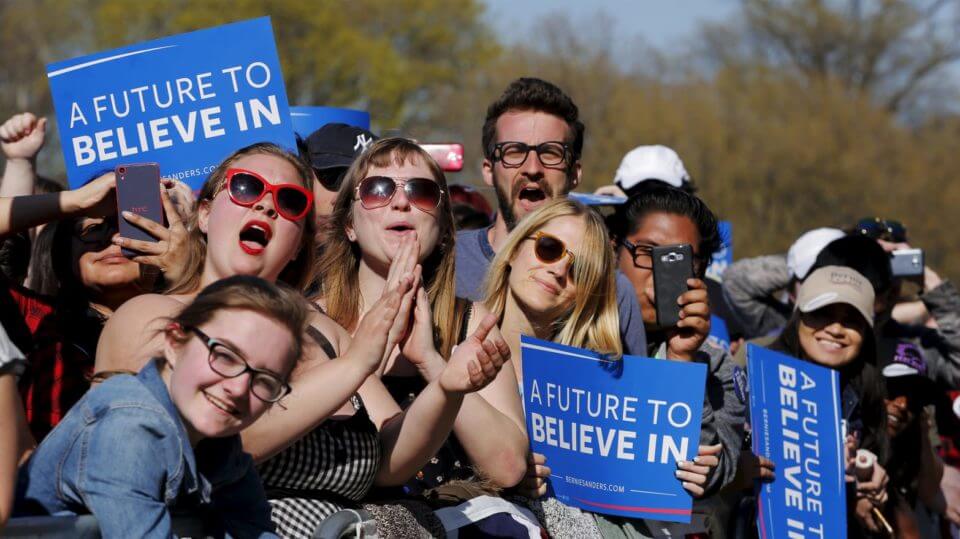
“Žižek’s position was essentially that he could either support Hillary Clinton and, thus, perpetuate the Democratic Party’s impotence—or support Donald Trump and hope that a new Left emerges.”
Now that former Vice President Joe Biden is the presumptive Democratic nominee, the progressive left is confronted with an unavoidable question: Should the progressive and social democratic left vote for the neoliberal Democratic candidate? The consequence of not voting is potentially to enable President Donald Trump to win the election and have another term as president. This would likely result in his administration pushing policies that are antithetical to the progressive agenda. The alternative is to support a Democratic nominee who does not—even remotely—share the progressive left’s vision.
It is self-evident why Progressives do not support President Trump (and I am not being dismissive when I say this). As such, I can comfortably assert that the progressive left is not ambivalent about whom it is going to vote for at this point but, rather, if it is going to vote at all. It comes down to either voting for Vice President Biden or saying “Forget the whole thing.” Unless, as Slavok Žižek did in 2016, one believes in an accelerationist notion that the re-election of President Trump would augment the progressive movement (due to the rhetoric and actual policies of a continued Trump administration), few on the progressive left will be voting for a second term for President Trump. With that said, it is worth exploring Žižek’s line of thinking.
As Žižek wrote, “In the last couple of years, I have been often asked by friends (and by ‘friends’) whether I still stand by my preference for Donald Trump over Hillary Clinton, or would I now admit that I was terribly wrong. My answer is easy to guess: not only do I stand by what I said, but I think last year’s events fully confirmed my choice…What happened in the US is that the Trump victory triggered a process of radicalisation in the Democratic Party—and this process is our only hope.”
Žižek’s position was essentially that he could either support Hillary Clinton and, thus, perpetuate the Democratic Party’s impotence—or support Donald Trump and hope that a new Left emerges. (Indeed, this new Left has emerged, with groups such as the Justice Democrats and figures like Rep. Alexandria Ocasio-Cortez.) So Žižek chose Trump. The issue, however, is that we do not know if these developments (i.e. the Justice Democrats and the like) were a distinct result of President’s Trump election—or an organic political progression, like the introduction of Senator Bernie Sanders’ policies into the mainstream. The Sanders’ movement, after all, well-predated November, 2016.
Yet, Vice President Biden is not much better—besides in his rhetoric.
I do not believe that voting for President Trump is something many progressives will do. Furthermore, it is not an action that I condone. However, allowing for a possible second term for the Trump administration by not voting is something that progressives could plausibly do—and should do. There are undeniable consequences for this: stricter immigration policies (i.e. the construction of the “wall,” as well as undocumented immigrants being sought after by Immigration and Customs Enforcement (ICE)), the continuation of the drone program, a fractured healthcare system, and the Supreme Court could become much more conservative.
Yet, Vice President Biden is not much better—besides in his rhetoric. His healthcare plan will still leave 10 million people uninsured; he will perpetuate foreign wars fueled by the military-industrial complex. He will never abolish ICE; he will continue to kill civilians in the Middle East via drone strikes, and he refuses to legalize cannabis at the federal level, despite it being legal in eleven states. There is, of course, the argument that one of the two will become president, and one is unequivocally better than the other. Sam Seder from The Majority Report has articulated this view, suggesting that, “I would vote for the candidate that would build less concentration camps.” (Seder employs the term “concentration camps” as a stand-in for the general concept of suffering.)
Michael Brooks, also from The Majority Report, also weighed-in on Seder’s utilitarian view of voting, saying that “There is a column A column B choice. Both are going to cause a huge amount of injustice and suffering—one less than the other. So what you do is go and opt for less suffering because voting isn’t really about a personal expression of your essence; it’s about a practical activity.” However, if any of the potential candidates are still constructing these “concentration camps,” to follow the term used in the thought experiment, then the democratic process that produced these choice has failed. As such, Seder and Brooks’ ultimate lesser evilism is indicative of contemporary political thought and the idea that we must choose between the candidates presented to us (regardless of their positions but, rather, according to the suffering differential between their positions). However, this view is unsustainable, if the Left seriously wishes to realize a progressive agenda. In order to do this, we must shift our mindset about voting; it cannot just be conceived of in the negative sense of what we avoid. It must be thought of in the positive sense of what can be realized by voting for a better candidate.
If progressive voters who do not really agree with Vice President Biden’s policies vote for him, then there will be no reason for the Democratic Party to appeal to progressive and younger demographics. This is because Democratic leaders will know that they will have our votes no matter what. Right now, it is not Democrat vs. Republican; it is the progressive left against conventional Democrats and Republicans. A radical fissure within the Democratic Party is necessary to make this new political landscape apparent. The Democratic Party must be seen for what it really is: the antithesis of the Left.
Teddy Duncan Jr. is an incoming graduate student at the University of South Florida.











If a progressive didn’t vote, or voted for a third party candidate in 2016 as a way to nudge the Democrats to the left, then where was the wave of progressive voters in the 2020 primaries? The strategy didn’t work. Instead the Democratic base voters have so far come out strongly for the moderate, establishment candidate, so much so, that Mr. Sanders has dropped out of the race.
The base voters of the Democratic Party are simply far more moderate than the modern progressive left.
This modern version of the progressive left has seemingly lost its collective mind. Aggressive and sanctimonious enforcers of woke culture, the modern far left has become as insufferable as the far right.
Democratic base voters who prefer moderates generally like the U.S. the way it is and aren’t interested in utopian fantasies. And they probably wish strongly to relieve us of the misery that is Mr. Trump.
1. The establishment candidate in 2016 that had the “democratic base” lost to Donald Trump. I don’t see why Joe Biden (with near identical policies and who is seemingly in cognitive decline) would win 2020.
2. This isn’t a “strategy”, this is the ethics of voting, if a candidate doesn’t represent your values and all they have to offer is NOT being the other candidate, then they aren’t a viable candidate for a country that requires structural change. It doesn’t matter if there isn’t an alternative.
3. “Utopian fantasies”? Providing all citizens of a country healthcare (like every other major nation) is utopian? Legalizing cannabis when it’s supported by the majority of the country is radical? Not killing civilians via remote drone strikes is radical/utopian?
4. “Democratic base voters who prefer moderates generally like the U.S. the way it is”: you mean that they are complacent with wars and a fractured healthcare system?
The moderate base supported Biden because all of the other candidates coalesced behind him, after a few back-room calls from Obama.
I just think that the base-moderate democratic party is no longer concerned with policies and has become the not-Trump party.
I tentatively agree that the “woke” identity politics faction of the left can be aggressive (mostly a marginal part of the progressive left and also mostly online).
1. The establishment candidate in 2016 that had the “democratic base” lost to Donald Trump. I don’t see why Joe Biden (with near identical policies and who is seemingly in cognitive decline) would win 2020.
2. This isn’t a “strategy”, this is the ethics of voting, if a candidate doesn’t represent your values and all they have to offer is NOT being the other candidate, then they aren’t a viable candidate for a country that requires structural change. It doesn’t matter if there isn’t an alternative.
3. “Utopian fantasies”? Providing all citizens of a country healthcare (like every other major nation) is utopian? Legalizing cannabis when it’s supported by the majority of the country is radical? Not allowing civilians to die via remote drone strikes is radical/utopian?
4. “Democratic base voters who prefer moderates generally like the U.S. the way it is”: you mean that they are complacent with wars and a fractured healthcare system?
The moderate base supported Biden because all of the other candidates coalesced behind him, after a few back-room calls from Obama.
I just think that the base-moderate democratic party is no longer concerned with policies and has become the not-Trump party.
I tentatively agree that the “woke” identity politics faction of the left can be aggresive (mostly a marginal part of the progressive left and also mostly online).